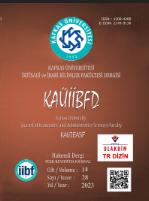DO ENVIRONMENTAL POLICY STRINGENCY AND INNOVATION REDUCE CARBON EMISSIONS: EMPIRICAL EVIDENCE FROM G-7 COUNTRIES
DO ENVIRONMENTAL POLICY STRINGENCY AND INNOVATION REDUCE CARBON EMISSIONS: EMPIRICAL EVIDENCE FROM G-7 COUNTRIES
Author(s): Ayvaz Bartik, Kerem KarabulutSubject(s): Energy and Environmental Studies, Environmental and Energy policy
Published by: Kafkas Üniversitesi Sağlık, Kültür ve Spor Daire Başkanlığı Dijital Baskı Merkezi
Keywords: Environmental policy strictness; innovation; carbon emissions; panel data econometrics;
Summary/Abstract: Public policies have gained significant importance in technological innovations that have come to the fore in reducing the environmental impact of economic activities. Especially in developed countries, significant progress has been made in policies in this area. Reducing the negative externalities that cause environmental pollution in production and reducing their adverse effects on natural resources such as air and water is an indicator of how seriously these policies are taken. In this context, the study aims to empirically examine the effect of innovations and environmental policy strictness on the reduction of carbon emissions in G-7 countries for the period 1994-2019 using linear panel regression methods. After performing various specification and assumption tests, the Driscoll-Kraay random effects model was used to obtain coefficient estimates. In the study, the environmental policy stringency index was used to represent environmental policy strictness. The study findings indicate that an increase in environmental policy stringency reduces carbon emissions, while an increase in innovation increases carbon emissions.
Journal: Kafkas Üniversitesi İktisadi ve İdari Bilimler Fakültesi Dergisi
- Issue Year: 14/2023
- Issue No: 28
- Page Range: 847-870
- Page Count: 24
- Language: English

